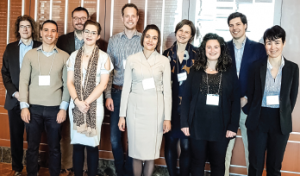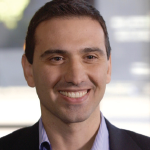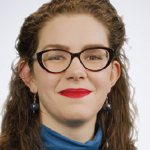
The 2018 ACR/EULAR exchange attendees.
Since 1998, the ACR/European League Against Rheumatism (EULAR) Exchange Program has supported junior academic rheumatologists, rheumatology professionals and health professionals in rheumatology in traveling from Europe to the U.S., and vice versa, to exchange clinical and research skills, expertise and knowledge. The program is designed to recognize outstanding early career faculty in rheumatology research, so we consider ourselves particularly lucky to be among the successful applicants.
As applicants in the October 2018 exchange, we represented both the clinical [Ioannis Parodis, MD, PhD (IP)] and ARP branches [Katie Druce, PhD (KD)] of the ACR audience. We like to think this is a testament not only to the appeal of the exchange program, but also to its selection criteria. Indeed, our group of 10 members included biomedical scientists, faculty, post-doctoral researchers and clinical research fellows from across different parts of Europe, with areas of interest spanning the full spectrum of rheumatology.
Background
KD: I’m a non-clinical research associate at the University of Manchester, England, with a background in psychology and epidemiology. I received my PhD in 2015 from the University of Aberdeen, where I focused on the relationship between fatigue, pain and disease activity in rheumatoid arthritis. Since I moved to Manchester, my research has included investigating sleep and fatigue in rheumatic diseases using remote monitoring technology, such as smartphone apps, sleep/activity monitors and at-home blood sampling techniques.
I applied for the exchange program largely due to the positive experiences two of my local colleagues had while on exchange in the preceding two years. I was told the exchange would be an exciting opportunity to meet with international peers and senior researchers, to share my work and learn from much admired experts in the field. It is safe to say the exchange did not disappoint.
IP: I’m a physician with a degree from the University of Athens, Greece, and have practiced at the Karolinska University Hospital in Stockholm since 2011. I have been a consultant rheumatologist there since 2012. I also teach and coordinate teaching activities in internal medicine at the medical school of the Karolinska Institutet. However, my heart really lies within clinical and translational research in the field of systemic lupus erythematosus. More specifically, I’d like to understand the connection between histology and clinical phenotype in lupus nephritis, and identify factors—clinical, histological or molecular—that predict long-term kidney outcomes. I am interested in the optimized use of conventional and new biologic therapies, studying clinical and immunological effects of treatments (e.g., anti-B-cell-activating factor [BAFF] treatment) and in an increased awareness of the importance of the patient’s perspective as an integral part of the clinical evaluation.
My application for the exchange program was prompted by a letter from EMEUNET (the Emerging EULAR Network), but it wasn’t until after I received the acceptance letter that I realized how blessed I should feel to have been chosen as a participant. I remember Prof. Lars Klareskog from my unit telling me he still had contact and collaboration with participants from such exchange programs during his early career years.
Our Experience in Chicago
Our exchange program was hosted by Professors Harris R. Perlman, PhD, and Richard M. Pope, MD, and supported by faculty members from Northwestern University, and a number of speakers from farther afield. We would particularly like to thank our hosts for their careful consideration in ensuring the faculty who supported the exchange were as diverse as those of us who attended. As a result, despite the heterogeneity in our group of exchange participants, we were all able to enjoy discussions with colleagues whose research interests aligned with our own. Further, we were able to benefit from hearing about the career progressions and, sometimes, pitfalls associated with different career paths.
Day 1
There was no fear of jet lag during our site visit to the Northwestern University Feinberg School of Medicine, because the day’s schedule was jam-packed with presentations from our hosts, keynote presentations on career development opportunities and lunchtime discussions with senior investigators and their junior faculty partners who had interests aligning with our own. Each exchange participant had the opportunity to present their work and discuss research ideas. At the end of the day, we were taken to dinner at a local restaurant for a meal attended by even more faculty members. There, the good food and the wine (or beer for some) made the atmosphere more informal and led to more laid-back discussions and exchange of experiences.
Day 2
The second day kicked off with an early (7:30 a.m.) breakfast and continued with more lectures and discussions about career development led by prominent rheumatology researchers, such as Richard Pope, MD, our host from Northwestern University; Joan M. Bathon, MD, from Columbia University, New York; Christopher D. Buckley, DPhil, from the University of Birmingham, England; Peter A. Merkel, MD, MPH, from the University of Pennsylvania, Philadelphia; and Iain McInnes, MD, PhD, from the University of Glasgow, Scotland, U.K. We also heard and discussed research presentations by the remaining European scholars. The aim was to receive feedback from people outside our own research microworlds, and it was precious and insightful. At about lunchtime, we wrapped up, and the group of scholars ended up at a Mexican lunch place for food and continued networking. At that point, we were a well-bonded group.
New Perspectives
KD: Naturally, if you asked each member of our exchange group, they would likely all report different take-home messages from their time in the program. But for me, the most important message was that even the most successful people have experienced the ups and downs associated with a career in academia, and no one right way exists to be a successful rheumatology professional.
We had a contrast in presenters: Anne-Marie Malfait, MD, PhD, of Rush University, Chicago, spoke about relocating across the world to follow exciting research opportunities. Dr. McInnes told us the grass isn’t always greener on the other side (or in other research institutions), if you cultivate your own area well enough. It was also really inspiring to hear from Dr. Bathon, who spoke about her journey through her clinical training and early research career at a time when few women were in the field.
IP: As Katie mentioned above, the take-home messages are most likely different for each one of the scholars. Personally, I remember the idea that important ingredients for successful careers are brilliant (novel) ideas and persistence. The road will not always be strewn with roses, and even if it ostensibly appears to be like that, one should be aware of the thorns. Indeed, if you have everybody on your side from the beginning of your independent career, you may have to reconsider the novelty of your hypothesis.
Last, but not least, the take-home message that most probably is common for all scholars is what the exchange program was about—collaboration: Great things cannot be accomplished by solo players. It takes a team to make your idea flourish, and the entire community within your field will have to embrace your product. So for me, the take-home messages could be summarized as brilliant ideas, persistence, collaboration.
In fact, I am happy to say my first collaboration with a co-participant, which started during the conference, has already been published.
Summary
The ACR/EULAR exchange provides a unique opportunity for transatlantic research exchange. Without a doubt, all program attendees benefited from participating in the exchange, and we are pleased to say the group has even met up since the exchange at the most recent EULAR Congress in Madrid this year. Indeed, we would say the friendships created during the exchange were as important to us as the formal networking opportunities it afforded. We would strongly recommend our fellow junior colleagues from across Europe consider applying for this exceptional program, as well as colleagues from the U.S. consider applying for an exchange scholarship to Europe. We would also echo this call for our senior colleagues in the U.S. to consider applying to host this highly prestigious program to support early career researchers in your field.
 Ioannis Parodis, MD, PhD, is a consultant rheumatologist at Karolinska University Hospital, Stockholm, Sweden.
Ioannis Parodis, MD, PhD, is a consultant rheumatologist at Karolinska University Hospital, Stockholm, Sweden.
 Katie Druce, PhD, is a non-clinical research associate at the University of Manchester.
Katie Druce, PhD, is a non-clinical research associate at the University of Manchester.
Acknowledgments
We would like to thank the ACR, EULAR, EMEUNET and our hosts at Northwestern University for providing this exchange opportunity and tailoring an excellent program. We send a special thanks to Ngozi Afulezi and Geneviève Schärer for organizing and supporting our exchange experience.
